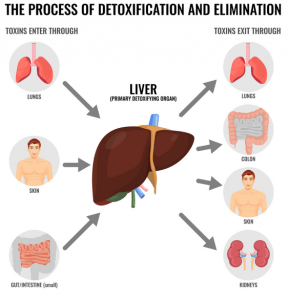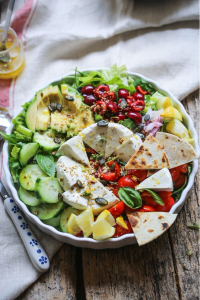Detoxification: How to Remove Toxins from your Body
Detoxification (or detox) is a buzz word in diet culture. Have you been wondering how to remove toxins from your body? It is so common to hear about all the latest fads for detox, like juice cleanses, fasting, and skinny teas.
This kind of diet culture talk is particularly abundant after the holiday season with the promise of rapid weight loss.
These detoxes usually involve several days of following some sort of extremely restrictive diet with the promise of removing toxins and helping you feel better. It is easy to fall into this trap, we get it.
Diet culture is rampant and this billion dollar industry knows how to hook you in and make these promises sound real. Especially when some of our favorite influencers or celebrities are spouting its praises.
But let’s just take a step back! True detox is much different than what we may think.

Detoxification is the process of removing toxic substances from the body. Toxins can be everywhere in our environments, from personal care products, stress, heavy metals, bacteria, and even high fat diets.
Detoxification removes these items along with excess hormones, chemicals, and pesticides that are not supposed to be present in the body in high amounts.
Did you know you have an amazing detox system built right into your body?? Almost all of the body’s organs are involved in this process. Side note, there are some people who have impaired abilities to detox. Non-alcoholic fatty liver disease and mold toxicity are two such conditions.
But for the most part, we don’t need juice cleanses and fancy teas to detox because our body already does it for us.

Detox is absolutely vital for the body. However, there are things that can negatively impact the process of detoxification, such as fasting (!! which is basically any type of so called cleanse!!), alcohol, and smoking.
If detox is your goal, the juice cleanses everyone hears about on TV may not be the smartest idea! We need enough protein, fat, and carbohydrates as well as vitamins and minerals for the detoxication process!
So, if fasting and juice cleanses are not the answer, then what can you do to help your body remove toxins more effectively and work towards your optimal health? Many foods and food groups are needed to accomplish proper detoxification.
6 Ways to Remove Toxins from your Body
1. Fiber
For detoxification, fiber binds excess toxins and removes them in stool, specifically soluble fiber such as oatmeal, flaxseeds, blueberries, and beans. Having regular bowel movements ensures the unimpaired removal of toxins, which benefits the primary organ involved in detox: the liver. Women should consume 25 grams or more of fiber per day from fruits, vegetables, whole grains such as brown rice, quinoa, and oats, legumes, and nuts/seeds. Men should consume 35 grams or more of fiber per day from the same food sources.
Need some ideas to increase fiber? Check out our recipe database for recipes like Chia Seed Pudding, Fiesta Black Beans, and Lentil Curry.

2. Calories
Diet recommendations often begin with calories. An adequate intake of calories fuels the detoxification pathways and also improves blood sugar control. Be sure to consume enough calories to support your daily activities and hunger as underconsumption can cause your body to hold onto toxins, not eliminate!
3. Antioxidants
Antioxidants are anti-inflammatory and found in high amounts in fruits and vegetables. Eating the rainbow of fruits/vegetables ensures we are covering our bases and reaping the benefits of each one. For example, orange-colored fruits and vegetables are especially beneficial for eyesight! Our Pumpkin Soup is a tasty way to increase those orange veggies! Additional examples of antioxidants are milk thistle, curcumin (turmeric), and ginger. Our pineapple mocktail is the perfect detox drink because it doesn’t contain alcohol and has ginger!

4. Cruciferous Vegetables and Leafy Greens
Broccoli, cauliflower, cabbage, brussel sprouts, collards, and bok choy are the primary cruciferous vegetables and should be consumed daily for detoxification, if possible. Leafy greens include what the name entails. Greens that are leafy such as lettuces and chard!
We have so many recipes for cruciferous and leafy veggies! My favorites are probably Buffalo Cauliflower and Roasted Brussels Sprouts with Pistachios and Pomegranate.

5. Protein
Protein is made up of amino acid chains. All 20 of the amino acids are needed for detoxification as they enable the liver to process toxins and remove them. We cannot detox without protein!
Both plant and animal proteins are strong sources, but supplemental protein powder may be needed for those on a vegetarian diet or who do not consume enough protein.
Consuming high quality protein with all meals and snacks is a good general rule of thumb!

6. B Vitamins
When we talk about B vitamins, many people know B12 and folate. However, we often forget about the handful of others, such as B6 and niacin. B vitamins are primarily found in animal proteins, legumes, and whole grains and are used for important processes and enzymes in the body related to detoxification.
A balanced, varied diet is our best bet for making sure we have enough of these nutrients on board!

So what is the best way to detox your body?
Between all of these major groups, there is significant overlap. For example, fruits and vegetables are antioxidants, sources of fiber and B vitamins.
In short, ensuring proper detoxification requires adequate nutrients, not the restriction of these through ill-founded dietary practices like juice cleanses and fasting. Individuals looking to optimize detoxification would benefit from following a nutritious eating pattern that consists of adequate calories, 8 servings of fruits and vegetables of all different colors, whole grains, legumes, protein, and unsaturated fats from nuts/seeds/oils.

Are you caught up in the promises of diet culture and don’t know where to turn next? Check out our blog on how to diet and how to make it your last diet ever.
REFERENCE: University of Western States Detoxification Course
-Blog reviewed and updated by Rebecca Bitzer MS RD LD September 10, 2021
Kathleen Tabb is a registered dietitian based in Maryland. She specializes in digestive conditions such as irritable bowel syndrome (IBS) and has extensive training through her master’s degree in integrative and functional nutrition. She is passionate about looking at her clients holistically to illuminate the root cause of their concerns in order to improve health and quality of life



